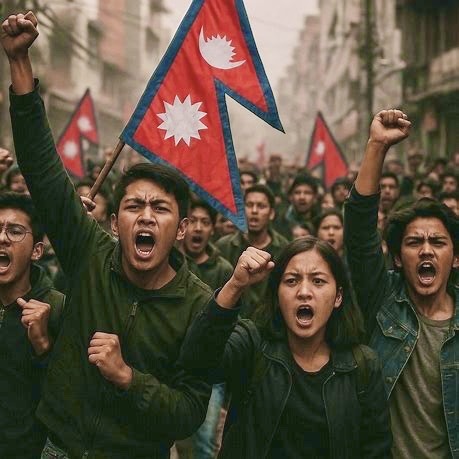
Reclaiming Nepal's Soul: From Civic Unrest to Principled Reconstruction
The recent convulsions in Nepal, manifesting as a revolutionary movement and subsequent civic unrest, project a profound crisis of governance and societal trust.
This crucible of upheaval, born from decades of endemic corruption, systemic nepotism, and a widening chasm between an entrenched elite and a disillusioned populace, demands not merely a restoration of order, but a fundamental redesign of the national compact.
The devastation of public property, heritage sites, and invaluable archives represents more than material loss; it signifies a rupture with the past, necessitating a sober, principled reconstruction that acknowledges the grievances of the disenfranchised.
Immediate post-conflict governance requires a paradigm shift, moving beyond conventional politics to embrace a technocratic, transitional authority. This body, composed of credentialed experts from civil society, academia, and the private sector, must command both intellectual acumen and moral integrity.
Its primary mandate involves the immediate stabilization of key public services, ensuring the provision of essential resources and infrastructure to a populace reeling from economic agony. This temporary arrangement circumvents the political horse-trading that previously paralyzed progress, establishing a singular, apolitical focus on national renewal.
Rebuilding a shattered nation necessitates a multi-pronged strategy. The restoration of public and private property forms the visible component, but the deeper task lies in revitalizing the economic engine. Nepal's over-reliance on remittances, a testament to its domestic job scarcity, exposes a brittle economic foundation.
This transition must pivot towards fostering a vibrant, localized economy. Encouraging private investment in productive sectors—agriculture, manufacturing, and sustainable tourism—will create employment opportunities, offering a tangible alternative to the current youth exodus.
A comprehensive, transparent audit of the nation's financial systems becomes an indispensable prerequisite for systemic reform. This process must expose and dismantle the patronage networks and illicit financial flows that have long corroded the state.
Public accountability mechanisms must follow, including the establishment of an independent, empowered anti-corruption commission with the authority to prosecute wrongdoers regardless of their political affiliation. Such decisive action signals a break from the past, restoring faith in the state's capacity for justice.
Addressing the socio-political challenges demands a delicate balancing act. While the anger of the populace is justified, a cycle of retribution merely perpetuates instability. A national truth and reconciliation commission could provide a forum for acknowledging past injustices, healing collective trauma, and fostering a sense of shared purpose.
This initiative, rather than fixating on blame, could document the human cost of corruption and misgovernance, laying the groundwork for a more inclusive and equitable future.
The restoration of national archives and heritage sites represents a symbolic act of reclaiming a shared history. These acts of vandalism, a rejection of a failed state, demand a response that reaffirms the value of cultural memory and national identity.
Engaging local communities and youth in the reconstruction efforts will not only accelerate the physical rebuilding process but also imbue it with a sense of collective ownership, transforming a broken past into a unified, aspirational future.
This crisis also projects a critical inflection point for global diplomacy. Beyond its borders, Nepal’s geostrategic position ensnares it in a complex geopolitical tug-of-war among India, China, and the US-led Western powers.
Forged by decades of political opportunism and a widening chasm between an entrenched elite and a disillusioned populace, the recent unrest demands a concerted international response that transcends competitive influence. Rather than viewing this moment as an opportunity to secure a new proxy, the global community must unify to stabilize a nation in peril.
A sustained, collaborative effort to rebuild its institutions, restore its cultural heritage, and mend its social fabric is not merely a humanitarian imperative; it is a strategic necessity that honors Nepal's sovereignty and safeguards regional stability. This collective action serves as a vital inoculation against the very instability that external rivalries could foment.
A pragmatic blueprint for this international support must pivot from a conventional aid model to a transformative partnership. The immediate financial infusions, while essential for rebuilding public property and national archives, must be tethered to transparent, merit-based governance.
India, as a primary trade partner, and China, a key infrastructure investor, can anchor a new economic paradigm by revitalizing productive sectors, which would create a tangible alternative to the youth exodus. The US-led Western powers can supplement this with expertise in developing robust anti-corruption commissions, fostering a vibrant civil society, and cultivating a legal framework that holds political and bureaucratic elites accountable.
Such synchronized assistance would not only address the physical devastation but would also dismantle the patronage networks and systemic flaws that spawned this crisis, offering Nepal a future anchored in self-reliance and meritocracy.
Indeed, Nepal's path forward rests on a profound reorientation from self-serving politics to public service. This moment of crisis presents a unique, albeit painful, opportunity to forge a new national identity—one defined by resilience, transparency, and meritocracy.
The nation's leadership must now seize this opportunity, steering its course towards a future anchored in justice, prosperity, and enduring stability, thereby honoring the sacrifices made for a better tomorrow.